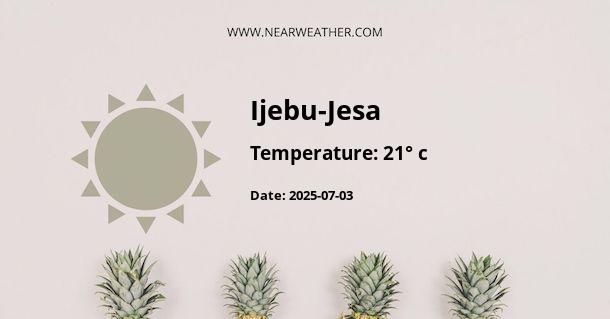Ijebu Ijesha, Nigeria: Climate and Weather Year Round
Ijebu Ijesha is a town located in the southwestern part of Nigeria, specifically in Osun State. It is known for its rich history, cultural heritage, and beautiful landscapes. Understanding the climate and weather conditions in Ijebu Ijesha is essential for residents and visitors alike. In this article, we will explore the climate patterns, temperature range, precipitation levels, and other important weather information for Ijebu Ijesha throughout the year.
Climate Classification
Ijebu Ijesha falls under the tropical savanna climate classification (Aw) according to the Köppen climate classification system. This means that the town experiences distinct wet and dry seasons throughout the year.
Temperature Range
The temperature in Ijebu Ijesha remains relatively high throughout the year, with little variation between seasons. The average daily temperature ranges from 25°C (77°F) to 32°C (90°F). The hottest months are usually between February and March, while the coolest months are between August and September.
Here's a table summarizing the average monthly temperatures in Ijebu Ijesha:
| Month | Average Temperature (°C) |
|---|---|
| January | 29 |
| February | 31 |
| March | 31 |
| April | 30 |
| May | 29 |
| June | 28 |
| July | 27 |
| August | 27 |
| September | 27 |
| October | 29 |
| November | 29 |
| December | 29 |
Precipitation
Ijebu Ijesha experiences a marked wet season and a relatively dry season. The wet season typically starts in April and lasts until October, while the dry season runs from November to March. The town receives an average annual rainfall of about 1,500 millimeters (59 inches).
Here's a chart showing the average monthly rainfall in Ijebu Ijesha:
"The wettest months in Ijebu Ijesha are usually between May and July, with rainfall averaging around 250-300mm per month."

Humidity
Ijebu Ijesha experiences high humidity levels throughout the year. The humidity is influenced by the proximity to the Atlantic Ocean and the dense vegetation in the area. Humidity levels range from 70% to 90%, with the highest levels occurring during the wet season.
Weather Hazards
Although Ijebu Ijesha generally experiences favorable weather conditions, there are some weather hazards that residents and visitors should be aware of. Thunderstorms and heavy rainfall can occur during the wet season, leading to localized flooding in some areas. It is important to stay updated with weather forecasts and take necessary precautions during such events.
Best Time to Visit
The best time to visit Ijebu Ijesha is during the dry season, particularly between November and March. During this period, the weather is relatively cooler and drier, making it more comfortable for outdoor activities and exploration.
It is worth noting that the cultural festivals in Ijebu Ijesha, such as the Orosun Festival, typically take place during the dry season. These festivals showcase the rich cultural heritage of the town and attract visitors from different parts of Nigeria and beyond.
Conclusion
Ijebu Ijesha, Nigeria, experiences a tropical savanna climate with distinct wet and dry seasons. The temperature remains relatively high throughout the year, with little variation between seasons. The wet season lasts from April to October, with the highest rainfall occurring between May and July. The dry season runs from November to March, making it the best time to visit Ijebu Ijesha. It is important to stay aware of the weather hazards, such as thunderstorms and localized flooding, during the wet season.
A - Ijebu-Jesa's Latitude is 7.683330 & Longitude is 4.816670.
A - Weather in Ijebu-Jesa is 24° today.
A - Climate Conditions in Ijebu-Jesa shows overcast clouds today.
A - Humidity in Ijebu-Jesa is 61% today.
A - Wind speed in Ijebu-Jesa is 5.08 km/h, flowing at 186° wind direction. today.
